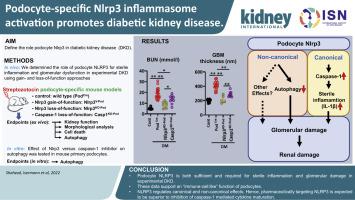Kidney International ( IF 19.6 ) Pub Date : 2022-06-30 , DOI: 10.1016/j.kint.2022.06.010 Khurrum Shahzad 1 , Sameen Fatima 2 , Hamzah Khawaja 1 , Ahmed Elwakiel 1 , Ihsan Gadi 1 , Saira Ambreen 1 , Silke Zimmermann 1 , Peter R Mertens 3 , Ronald Biemann 1 , Berend Isermann 1

|
Efficient therapies for diabetic kidney disease (DKD), now the leading cause of kidney failure, are lacking. One hallmark of DKD is sterile inflammation (inflammation in absence of microorganisms), but the underlying molecular mechanisms remain poorly understood. The NLRP3 inflammasome (innate immune system receptors and sensors regulating activation of caspase-1) is a mechanism of sterile inflammation known to be activated by metabolic stimuli and reactive metabolites associated with DKD, including inflammasome activation in podocytes. However, whether NLRP3 inflammasome activation in podocytes contributes to sterile inflammation and glomerular damage in DKD remains unknown. Here, we found that kidney damage, as reflected by increased albuminuria, glomerular mesangial expansion and glomerular basement membrane thickness was aggravated in hyperglycemic mice with podocyte-specific expression of an Nlrp3 gain-of-function mutant (Nlrp3A350V). In contrast, hyperglycemic mice with podocyte-specific Nlrp3 or Caspase-1 deficiency showed protection against DKD. Intriguingly, podocyte-specific Nlrp3 deficiency was fully protective, while podocyte-specific caspase-1 deficiency was only partially protective. Podocyte-specific Nlrp3, but not caspase-1 deficiency, maintained glomerular autophagy in hyperglycemic mice, suggesting that podocyte Nlrp3 exerts both canonical and non-canonical effects. Thus, podocyte NLRP3 inflammasome activation is both sufficient and required for DKD and supports the concept that podocytes exert some immune cell–like functions. Hence, as podocyte NLRP3 exerts non-canonical and canonical effects, targeting NLRP3 may be a promising therapeutic approach in DKD.
中文翻译:

足细胞特异性 Nlrp3 炎性体激活促进糖尿病肾病
糖尿病肾病 (DKD) 是目前导致肾衰竭的主要原因,目前缺乏有效的治疗方法。DKD 的一个标志是无菌性炎症(没有微生物的炎症),但其潜在的分子机制仍然知之甚少。NLRP3 炎症小体(先天免疫系统受体和调节 caspase-1 激活的传感器)是一种无菌炎症机制,已知可被与 DKD 相关的代谢刺激和反应性代谢物激活,包括足细胞中的炎症小体激活。然而,足细胞中 NLRP3 炎症小体的激活是否会导致 DKD 中的无菌性炎症和肾小球损伤仍然未知。在这里,我们发现肾损伤,如白蛋白尿增加所反映的那样,具有足细胞特异性表达 Nlrp3 功能获得突变体 (Nlrp3A350V) 的高血糖小鼠肾小球系膜扩张和肾小球基底膜厚度加重。相比之下,具有足细胞特异性 Nlrp3 或 Caspase-1 缺陷的高血糖小鼠显示出对 DKD 的保护作用。有趣的是,足细胞特异性 Nlrp3 缺乏具有完全保护作用,而足细胞特异性 caspase-1 缺乏仅具有部分保护作用。足细胞特异性 Nlrp3(而非 caspase-1 缺乏)在高血糖小鼠中维持肾小球自噬,这表明足细胞 Nlrp3 发挥典型和非典型效应。因此,足细胞 NLRP3 炎性体激活对于 DKD 来说既足够又需要,并支持足细胞发挥一些免疫细胞样功能的概念。因此,


























 京公网安备 11010802027423号
京公网安备 11010802027423号